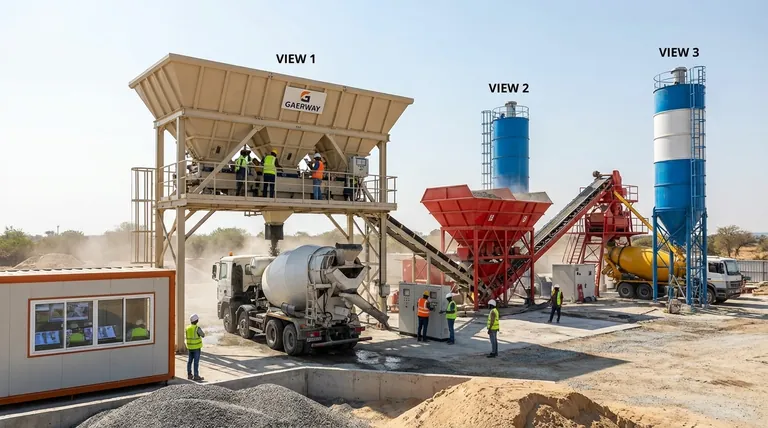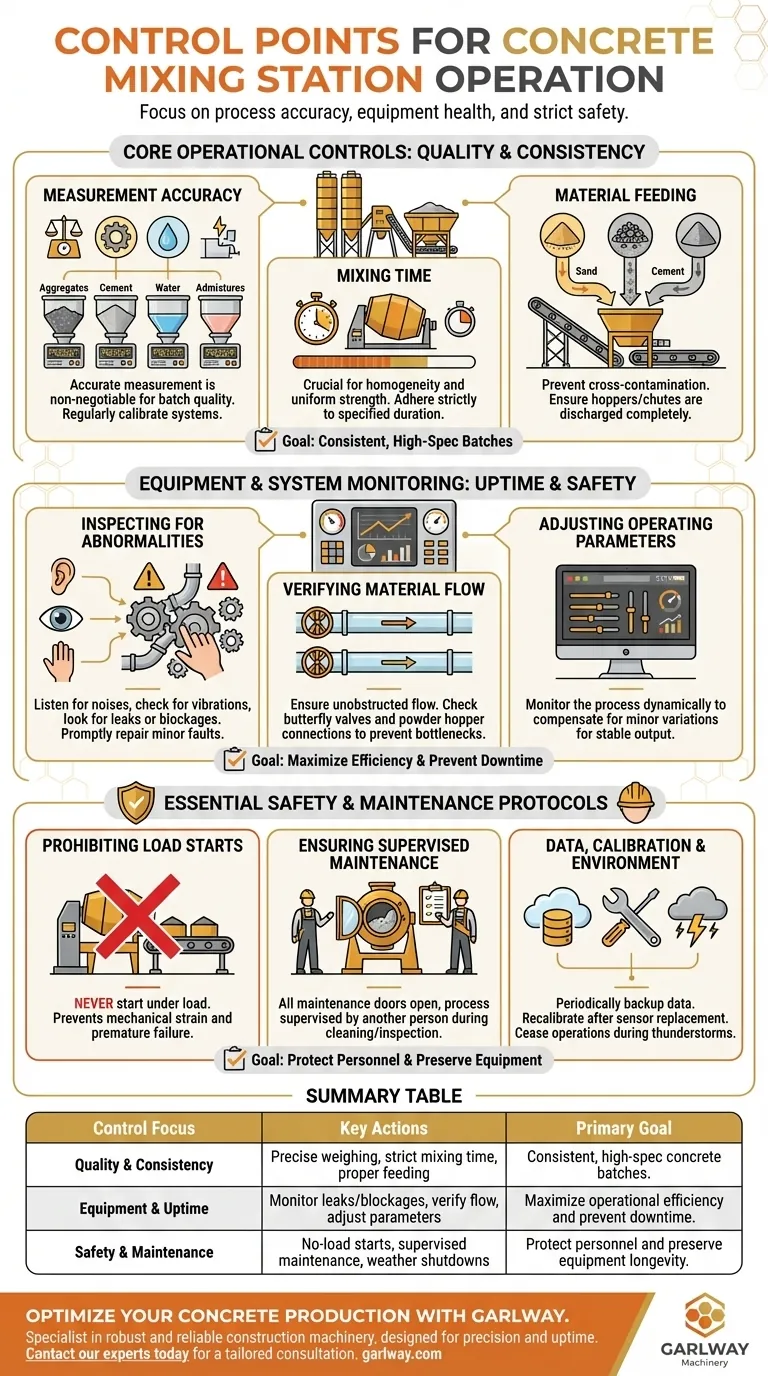To properly control a concrete mixing station during operation, you must focus on the two most critical process variables: the accuracy of material measurements and the duration of the mixing time. Beyond these, constant vigilance for any equipment abnormalities, such as leaks or blockages, is essential for maintaining consistent output and preventing costly shutdowns.
The core task is not simply to run the machinery, but to manage a dynamic process. Effective control requires a systematic focus on three distinct areas: ensuring the quality of the inputs, monitoring the health of the equipment, and enforcing strict safety protocols.

Core Operational Controls: Quality and Consistency
The quality of the final concrete product is determined moments after the operation begins. These controls are non-negotiable for meeting specifications.
Measurement Accuracy
Every component—aggregates, cement, water, and admixtures—must be measured with precision. Inaccurate measurements directly lead to inconsistent batch quality, affecting strength, workability, and durability.
The weighing systems (scales and sensors) must be regularly calibrated, especially after any maintenance or replacement, to ensure they meet process requirements.
Mixing Time
Sufficient mixing time is critical for achieving a homogenous mixture where all ingredients are evenly distributed. This ensures uniform strength and consistency throughout the batch.
Operators must adhere to the specified mixing duration for the particular concrete recipe and resist the temptation to shorten cycles to increase output, as this will compromise quality.
Material Feeding
The sequence and method of feeding materials into the mixer are crucial. Aggregates should be prevented from entering other operating mechanisms.
Ideally, sand, stone, and cement should not be fed through the same chute to avoid cross-contamination. Hoppers and chutes must be completely discharged after each cycle to ensure the next batch starts with the correct proportions.
Equipment and System Monitoring: Uptime and Safety
A mixing station is a complex system of interconnected parts. Proactive monitoring prevents minor issues from escalating into major failures.
Inspecting for Abnormalities
Operators should be trained to constantly monitor the equipment's status. This includes listening for unusual noises, looking for vibrations, and checking for any leaks, particularly at the discharge outlet.
Promptly identifying and repairing any fault, no matter how minor, is key to preventing larger breakdowns and ensuring continuous, reliable operation.
Verifying Material Flow
Smooth and unobstructed material flow is vital for maintaining production schedules. Regularly check that butterfly valves and their related electrical components are functioning correctly.
Ensure the connection between the powder hopper and the mixer is clear to maintain the designed feeding time and prevent production bottlenecks.
Adjusting Operating Parameters
Experienced operators should monitor the overall process and adjust operating parameters as needed. This dynamic control helps compensate for minor variations in raw materials or ambient conditions to produce a stable, high-quality product.
Essential Safety and Maintenance Protocols
Controlling the operation extends beyond production; it involves a deep commitment to safety and equipment preservation.
Prohibiting Load Starts
Never start the mixer or the main conveyor belt when they are under load. This practice puts immense strain on motors and mechanical components, leading to premature failure and creating significant safety risks.
Ensuring Supervised Maintenance
During cleaning or internal inspection, all maintenance doors must be fully open and the process must be supervised by another person. This prevents accidental startups and ensures the safety of personnel working inside the machinery.
Data and Calibration Management
For modern, computer-controlled plants, periodically backing up operational data is a critical control. This protects against data loss and provides a historical record for troubleshooting.
After any sensor replacement on the weighing systems, an immediate recalibration is mandatory to restore measurement accuracy.
Environmental Awareness
Operations should cease during thunderstorms. The high-voltage systems and sensitive electronics in a mixing station are vulnerable to lightning strikes, which can cause severe damage that is typically not covered by warranty.
Making the Right Choice for Your Goal
Your operational priorities will determine where you focus your control efforts.
- If your primary focus is consistent product quality: Obsess over precise measurement accuracy, adhere strictly to specified mixing times, and ensure a clean, proper feeding sequence.
- If your primary focus is operational efficiency and uptime: Emphasize proactive equipment monitoring for any abnormalities and regularly verify that all material flow paths are unobstructed.
- If your primary focus is personnel and equipment safety: Enforce unwavering adherence to protocols like no-load starts, supervised maintenance, and shutting down during severe weather.
Ultimately, mastering the control of a concrete mixing station is about creating a culture of precision, vigilance, and safety.
Summary Table:
| Control Focus | Key Actions | Primary Goal |
|---|---|---|
| Quality & Consistency | Precise material weighing, strict mixing time, proper feeding sequence | Consistent, high-spec concrete batches |
| Equipment & Uptime | Monitor for leaks/blockages, verify material flow, adjust parameters | Maximize operational efficiency and prevent downtime |
| Safety & Maintenance | No-load starts, supervised maintenance, weather shutdowns | Protect personnel and preserve equipment longevity |
Optimize your concrete production with GARLWAY.
As a specialist in construction machinery, GARLWAY provides robust and reliable concrete batching plants, mixers, and winches designed for construction companies and contractors who demand precision and uptime. Our equipment integrates the operational controls you need to ensure consistent quality, maximize efficiency, and enhance jobsite safety.
Let us help you build a more productive and profitable operation. Contact our experts today for a consultation tailored to your project needs.
Visual Guide

Related Products
- HZS35 Small Cement Concrete Mixing Batch Plant
- Construction Products Concrete Plant Machine Mixing Concrete Mixer
- Portable Concrete Mixer Machine Equipment for Mixing Concrete
- HZS75 Concrete Batching Plant Cement Mixer Price Concrete Mixer Bunnings Mixing Plant
- HZS180 Ready Mix Concrete Plant for Foundations with Sand and Cement
People Also Ask
- What are the main steps in operating a concrete batch plant? Master the 4-Stage Production Process
- How does operator skill level affect concrete batching plant choice? Match Your Team to the Right Machine
- What is the primary function of a concrete mixing plant? Achieve Consistent, High-Quality Concrete at Scale
- What is the difference between a dry batch plant and a wet batch plant? Optimize Your Concrete Production
- What is the purpose of a cement silo in a concrete batching plant? Ensure Quality and Uninterrupted Production
- What are the standards for transportation vehicles in an environmentally friendly concrete mixing station? Ensure Full Compliance and Efficiency
- What are the common manifestations of sensor failure in concrete mixing stations? Identify & Fix Issues Fast
- What is a concrete batching plant and what are its main components? A Guide to High-Volume, Precise Concrete Production



















